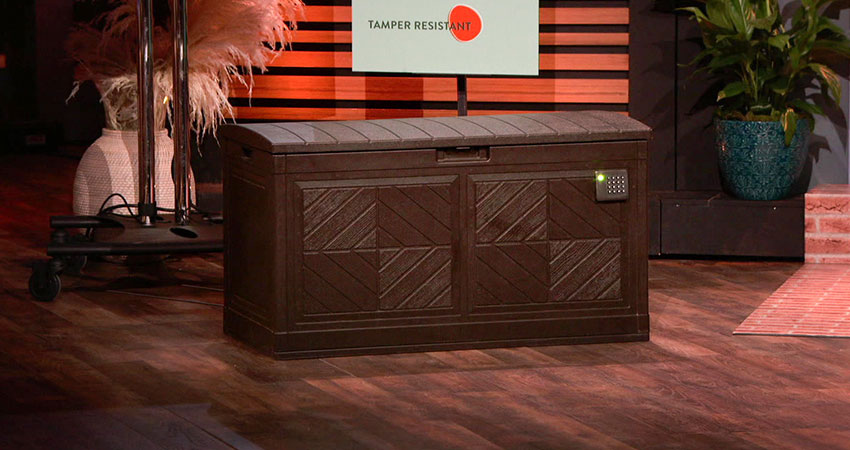Update: subsequent to this April 2021 story, DynoSafe founder Rebecca Romanucci said her company was preparing for manufacturing and launching its go-to-market plan.
The founders of DynoSafe, a patented refrigerated smart safe for home grocery delivery to the porch, won a deal on “Shark Tank,” with shark Robert Herjavec taking a 25% stake in the company for $150,000, while getting a controlling interest on the board, which also includes Mark Cuban.
The deal happened even though Rebecca Romanucci, CEO and co-founder of DynoSafe with her husband, Eric, forgot part of her pitch twice and was encouraged to continue by shark Lori Greiner. The Romanuccis said they have deals in place with major grocery that will be announced soon.
“I was anxiety ridden,” Rebecca Romanucci said of her appearance on the popular CNBC reality show. “For the actual pitch, because of coronavirus, we had to stand 20 feet back from the sharks and lean forward a lot.”
DynoSafe is temperature controlled by the owner via app and is unlocked with a one-time code by the delivery driver. It has adjustable compartments that can hold both perishables like groceries and medications as well as any non-perishable items.
When an order is placed by a customer on the app, DynoSafe assigns a name and a temperature to the one-time use code, which is shared with the retailer, and the unit automatically adjusts to the preassigned temperature in time for the delivery.
Rebecca told the sharks that DynoSafe’s patent assures it’s the only product of its kind with the combination of temperature control and a smart unlock system. She said she is in partnership talks with major grocery retailers, having presented at both CES and GroceryShop, and the product will become commercially available in Q3 of this year, retailing for under $400.
“It can be a seamless integration with retailers and our software, and they can have their branding on (the DynoSafe unit) and own the porch,” she said. “It’s all about loyalty. And it presents a whole lot more opportunity because it’s courier agnostic.”
Rebecca said some retailers may choose to make DynoSafe part of a subscription program, offering the unit, measuring 27” by 24” by 24” on a leased or discounted basis. Grocery subscriptions significantly increase customer loyalty, produces higher frequency of orders.
“They could offer a branded version for sale in store or online at a discount with a one-year delivery subscription,” she said. “The customer would own their container and be able to use it for delivery from any courier. Or they could lease the container with a subscription plan.”
With some offices and businesses reopening, and the prospect of fewer people working from home, the need for unattended, secure home delivery of groceries and other items represents a huge potential. Also, U.S. e-grocery continues to grow rapidly during the pandemic era, hitting $9.3 billion in January.
Unattended delivery units like DynoSafe can make the last mile more efficient. It allows for orders to be picked and delivered when it makes the most sense, using more optimized routing that saves on fuel and cuts down on Co2.
DynoSafe also avoids the “creep factor” of smart lock powered, in-home or garage delivery services from Amazon, Walmart and UPS. Amazon also enables delivery to the trunks of GM and Volvo vehicles.
Rebecca, a registered nurse, sold her medical services business in Scottsdale, AZ in 2017 to fund the startup of DynoSafe. She got the idea when she saw returning veterans suffering from PTSD who were nervous about venturing out to the store.
“My husband had returned from a mission in Afghanistan, and I noticed the brokenness of the vets,” she said; Eric is a colonel in the U.S Army Reserves. “Since then, it’s been one thing after another catapulting it forward, from Amazon buying Whole Foods in 2017 to the coronavirus pandemic.”

